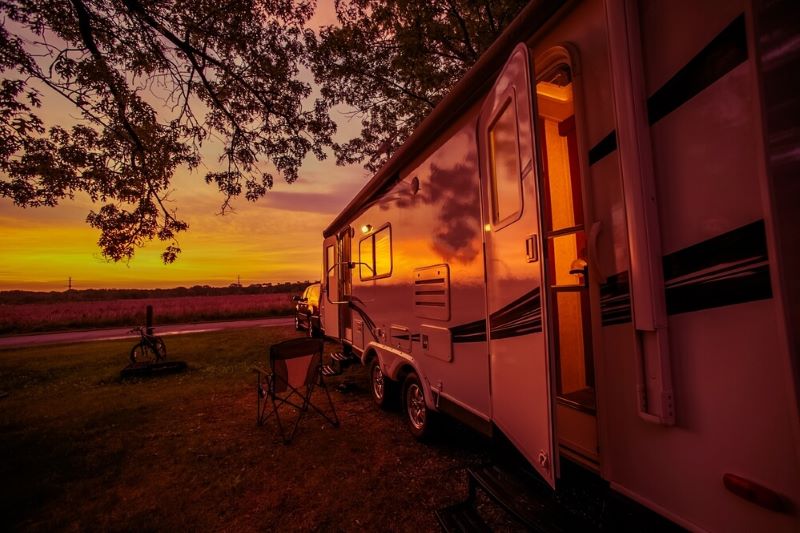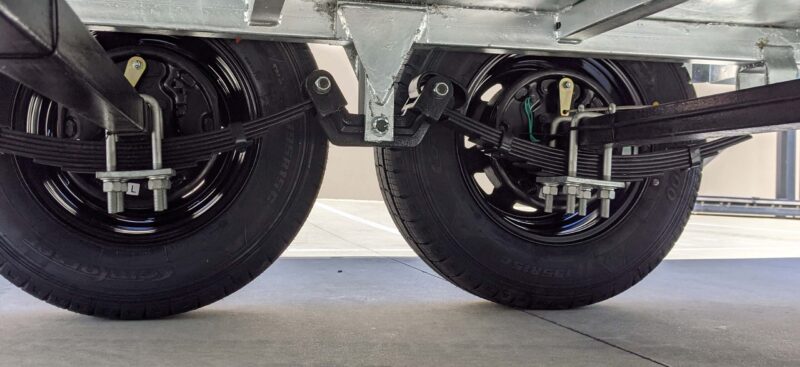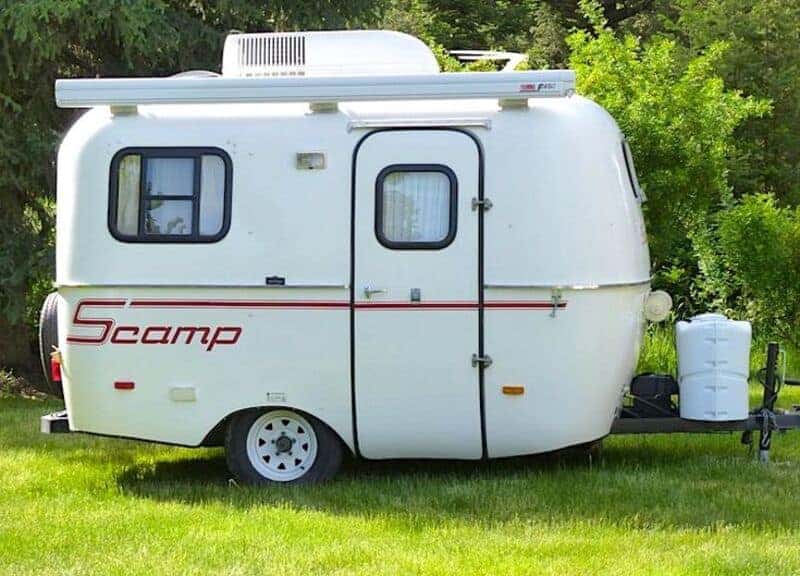On average, dealers mark up travel trailers around 35% to 40%. Now, that may sound pretty steep until you consider revenue versus profit. After all, dealers have to pay their workers, advertising, inventory costs, and in many cases, they get stuck with completing the cosmetic components of travel trailers delivered from the manufacturers.
That 40% dealer’s markup might make you blanch if you were to learn the specific cost per RV they have. Luckily, as a buyer, you get to focus on what you can afford and walk into the dealership armed with the right information.
Mathematics and the right timing can be a great advantage when you’re in the market for a shiny, new travel trailer. Understanding a dealer’s markup on various travel trailers is good, but understanding the “hows” and “whys” is even better.
In this article, we’ll help you understand the broad strokes of how much dealers mark up travel trailers and the factors behind it, so you can negotiate the best deal on that RV you have your eye on.
What is the Dealership Markup Percentage on Travel Trailers?
The industry standard is 40%, but it’s not always that high. Things change in the RV market consistently. You have seasons, more models than you can imagine, slow times of the year, and a variety of other market fluctuations that test that percentage from time to time.
Unless you’re an accountant, a lot of the dealer costs are difficult to keep straight without a complicated spreadsheet full of functions and macros. For instance, it might surprise you to know that a major part of an RV dealer’s income stream doesn’t necessarily come from selling travel trailers and motorhomes but from parts.
That’s right—parts. You can’t go down to your local auto parts store or Walmart and buy that must-have RV component.
How Much Does a Dealer Profit on a Travel Trailer?
Profit is harder to calculate when you’re dealing with non-specifics. The average amount a dealer makes per travel trailer is around 28.5%. However, the actual profit is between 5% and 15% of revenue. Dealers mark up travel trailers to maximize the overall profit. Yet you’ll typically see dealer prices below the MSRP.
Let’s say the dealer sells a travel trailer for $50,000. The dealer will usually make around $14,250. After operational costs, the dealer will keep between $712.50 to $2,137.50.
Of course, a lot of those travel trailers are a lot more expensive than $50,000. When you throw in used travel trailers and much smaller travel trailers (teardrops), profit margins shrink rapidly.
What Does MSRP Mean?
In terms of an acronym, MSRP means Manufacturer Suggested Retail Price. In terms of definition, it’s simply the price the manufacturer thinks is fair for everyone, including the manufacturer itself, the dealer, and the buyer.
You’ll notice that you always see the MSRP listed on the travel trailer, and you always see the marked-down dealer’s price below it. In a bubble, you would wonder how in the world the manufacturer or the dealer ever makes money if they always sell below MSRP.
That’s because the “wholesale price,” otherwise known as the invoice price, is what the dealer paid the manufacturer for the travel trailer, and it’s a lot less than MSRP. The dealer’s markup on travel trailers is a markup on the wholesale price, not MSRP.
Does a Dealer Have to List a Travel Trailer at MSRP?
By law, MSRP has to be listed on the travel trailer on-site. However, that’s not the case online. Some RV dealers list MSRP on their online travel trailers, and some don’t. It just depends on the dealer.
Also, just because they list the MSRP doesn’t mean that’s the true cost of the travel trailer. Most of the time, you’ll see a markdown price below the listed MSRP price, and that’s true online or on the dealership lot.
Can a Dealer Change the MSRP?
The manufacturer sets the MSRP, not the dealer. Once the manufacturer sets the price, that’s it. It’s important to note that the “S” in MSRP stands for “suggested.” It’s just a suggested price and is very rarely the price you’ll pay at the end of the day.
The ultimate price has several factors in it, including your own negotiating skills. The dealer often lists their own price below the MSRP, and that price doesn’t have to be final either. If you have some pretty good negotiating skills, it definitely won’t be the final price.
Should You Buy a Travel Trailer Listed at MSRP?
Never buy a travel trailer for the listed MSRP price. It’s very rare for MSRP to be the only price listed on the travel trailer. The odds of you paying MSRP are slim to none. There are a wide array of factors that go into the ultimate price, and that’s before the unpredictability of negotiations.
At the same time, it’s not like touring vacation hotspots in the Caribbean and the Mexican coast, where nothing has a price tag, and nothing is set in stone. Those places are a blast when it comes to bartering. Unfortunately, purchasing a travel trailer doesn’t get that wild. But neither is it a black-and-white finality, especially with all the external factors.
- Manufacturer-to-dealer incentives
- Final dealer invoice with manufacturer
- The time of year
- The dealer’s floorplan
- Dealer’s “markdown” from MSRP
- Trade in values
- Fair market value (and whether or not you’ve calculated it)
- Pre-inspection
- Whether or not you got ahold of the invoice price (dealers don’t want you to have that and never list it)
- How much price shopping you’ve done (pitting dealer versus dealer)
- Your negotiation skills
- Known depreciation values
- NADA Guides (Now known as J.D. Power Value Guide)
That’s a lot of information and a lot of intangibles. Knowing every one of them intimately—at least the ones you can get your hands on—provides you with a major advantage.
RVBlogger Editor’s Note On Paying MSRP: During the recent RV Boom, some RV dealerships were caught selling RVs at the MSRP price. At a time when customers had to wait for their travel trailers to be built, this practice was considered “unreasonable price gouging.” The RV Industry Association (RVIA) took the appropriate action to penalize these dealerships. It was found that only a few sales representatives were taking advantage of the situation versus a dealership policy.
How Do You Know You’re Getting a Fair Deal on Your Travel Trailer?
The above list is how you know you’re getting a fair deal. It’s not enough to walk on the buyer’s lot, accept the first price the dealer throws at you, and roll out with your new travel trailer in tow.
Start with shopping all the travel trailers (within your acceptable limitations) available in your local RV dealerships. You can do that physically or online.
Calculate the fair market value based on all of the above-listed information. Find out all of the RV dealer fees as best you can. They don’t publish these online, so you’ll probably have to go to the dealership to learn these costs. From there, you can subtract their costs to get an idea of the price of the RV. If it’s crunch time, you’ll see the associated price drops.
Do your homework. Study the J.D.Power Value Guide and write all of this stuff down for future reference at the dealership. It pays to be patient and take your time. That’s how you get a fair deal.
Can You Negotiate the Dealer Price on Your Travel Trailer?
You can negotiate anything you want when it comes to price. It doesn’t mean you’ll win. However, the odds of getting the price you want increase the more you know about the actual price of the travel trailer and the dealership’s information.
5 Best Strategies to Negotiate a Better Price for Your Travel Trailer
1. Use The J.D. Power Value Guide
If you want to drive the price down from the original dealer’s markup, it starts with the J.D. Power Value Guide. The values in the Guide are sales prices, but they will give you a very good foundation point to compare the price in front of you versus how the same RV model sells elsewhere.
Be aware each state has its own sales tax and other fees, which affects the total price.
2. Time It Right
There are two things to consider when it comes to timing, and both are advantageous. The first is to shop at the right time of the year—late fall and winter.
The second is harder. You’ll need to figure out what the in-house costs are for the dealer in question. Dealers markup travel trailers for profit, but they’ll mark them down in a hurry to avoid paying interest on their loan on the RV.
When a dealer finances RVs from the manufacturer, they have a certain period to pay it back before interest payments begin. That’s how typical RV Dealer loans work. Dealers markup travel trailers for profit, but they’ll mark them down in a hurry to avoid the interest on the loan activating.
3. Do Your Research
We can’t stress this enough. Shopping for a new RV should be something that takes weeks at a very minimum, months in a best-case scenario. Take your time and gather all the pertinent information you can get find.
4. Set Realistic Expectations
It’s good to be very optimistic, but it’s also good to set realistic expectations for yourself. No matter how good your negotiating skills are, there’s always someone better at it than you.
You may meet your match at the dealer and end up on your heels the entire time. You’ll never buy a travel trailer for pennies on the dollar.
5. Be Willing To Travel For A Good Deal
A hundred miles isn’t that bad when you can save thousands. Be willing to travel to RV dealerships further out from where you live. You may find a great deal at an RV dealership an hour away. Who knows, Even with the cost of gas, you may still save money on that desired RV!
6. Don’t Say Too Much To The Sales Person
This is a key negotiating tactic. Make them do all the talking, and never give it away that you want a specific travel trailer. Avoid all mention of your own financial situation or how much you’re willing to pay. Just keep it to yourself, at least until it’s time to spring your negotiating trap.
7. Attend RV Shows To Familiarize Yourself With The Market
Attending RV shows will not only help you gain knowledge but can also save you up to 25% on the price. A lot of RV dealers like to make a big mark at an RV show, and they want to get that first sale on the books in the morning. By the end of the day, they’re getting desperate. Time your arrival for either.
Will Some Dealers Try to Overcharge You?
Some dealers may try to overcharge you. That’s their job. At the end of the day, this is a business, and the dealer’s sales people need to put food on the table and keep the lights on, just like you.
No, that doesn’t mean they’re going to raise the price to an unreasonable level. What it does mean is they will try to sell you the offered price when you probably could have negotiated something much better.
If you want to avoid being overcharged, you have to be willing to walk away. The way you have to look at it is like this: the price sticker on the travel trailer is already more than what the RV is worth. Your job is to get that price down as low as you can.
While remaining within the realm of reality, come up with a fair deal for you that the dealer will accept. If you can’t reach that price point, walk away.
How to Avoid Overpaying for a Travel Trailer
The average travel trailer depreciates by a little more than 20% the moment you drive it off the lot for the first time. You should approach the travel trailer you want with the idea of taking the biggest chunk out of that 20% as you can.
- Buy your travel trailer in the late fall or winter
- Offer to pay in cash, but only when the dealer has said no to the deal
- Buy in bulk (explained below)
- Create a fixed budget and stick with it
- Attend RV shows
- Target as many dealers as you can within your area
- Price shop online until your typing fingers turn blue
- Walk away
- Point out problems with the travel trailer (only when buying used)
All of the above are self-explanatory, except for the part about buying in bulk. To pull this off, you need multiple friends or family members willing to buy travel trailers or motorhomes. If you can buy three, the dealers will be more than happy to come off their sticking price.
✅ Check out this video below, where an RV dealer spilled the beans on MSRP! Just click on the video below to watch it! 👇
Final Thoughts on How Much Dealers Can Markup Their Travel Trailers
While there will always be exceptions to the rule, expect a 35% to 40% dealers markup on travel trailers. But remember, good things come to those that wait. Patience is a virtue, as they say, and patience is also lucrative. At least in terms of saving yourself a good deal of money.
The RV market is a lot more convoluted than the auto market, but it’s not insurmountable. Stick to your budget and game plan. Do your homework and spend all the time necessary researching the type of travel trailer you want.
If you do all of those things, at the end of the day, that markup is nothing more than a number—a number that represents nothing.
Related Reading:
– 10 Best Travel Trailers Under $25,000
– 8 Travel Trailers With The Best Resale Value
About the Author:
Thomas Godwin is a full-time freelance writer with a BFA in Creative Writing, a U.S. Marine, and an avid outdoorsman.
When he’s not writing, he’s raising chickens and Appleyard ducks. Thomas also constructs teardrop campers (attempting to anyway) and kayaks the Blackwater River with his wife, two daughters, and his Dobermans.




